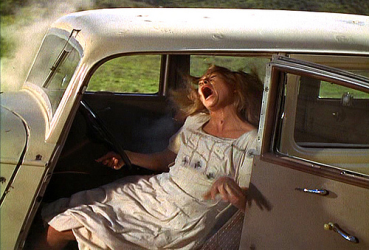I didn’t expect to like this movie, this poster child for that era of filmmaking where the “director was the auteur” that the critics love so well, and that was killed by Spielberg, Lucas, Corman (if we’re being honest) and had the final nail driven into its coffin by the disaster that was Heaven’s Gate.
I didn’t expect to like it, and I was surprised to discover that, not only did I not like it, I was mostly bored throughout. I expected it to be, I dunno, more sensationally boring—and if you can’t imagine what “sensationally boring” would be like, think grindhouse or splatter, where everything is really conventional and dull but then there’s some gratuitous nudity and graphical violence in the mix—but this didn’t really have either. I mean, I guess it’s violent, but it’s ’70s cop drama violence. A little more (really cartoonish) blood than on “Kojak”.

Pictured: Beautiful morons.
And this is the sort of movie The Old Man used to go on about. He would concede (e.g.) Martin Scorsese’s technical prowess but then say, “So why waste that on telling the story of a stupid, wife-beating drunk, whose main claim to fame was being too stupid to know when to fall down.” (A not inaccurate capsule of Raging Bull.)
In this case we have beautiful-but-moronic and sexually dysfunctional Clyde Barrows (Warren Beatty) who is yet still charismatic enough to lure beautiful-and-perhaps-slightly-less-stupid Bonnie Parker (Faye Dunaway) away from her not-very-interesting life as a waitress to go bank robbing with him. Let me pause for a minute and discuss how stupid this set-up is: Barrow is all charm and sexiness when he seduces Parker but then when it’s time to put out, he’s practically surprised and a little appalled that she wants to have sex with him.
There’s no evidence for any of this, mind you. Besides not making sense, it adds very little to the story, except to give them duo a sort of character arc where they can have sex right before they’re murdered by the law. Jesus save us from the ’60s.

I’d like a do-over on this “free will” business.
They’re not competent. They rob banks rather willy-nilly. And naturally, they end up killing some poor sap who takes his job a little too seriously. Barrows is sort of flabbergasted that he meets with any violence at all. Again, sub-moron level stuff. But it’s okay, ’cause they’re pretty. They get a kid mechanic, C.W. Moss (Michael J. Pollard), on board—by this time he’s 28, but he played a teenager in a “Star Trek” episode (“Miri”) around the same time and I always sort of felt he was playing a kid in Roxanne 20 years later, and his hair was white then. Anyway, it’s actually Moss’s passion for double-parking the car legally that results in the first murder, I believe.
Later they hook up with Barrow’s brother (Gene Hackman) and sister-in-law (Estelle Parsons) who reluctantly joins in the shenanigans. This is kind of tragic and not really developed: She’s put herself out (as a minister’s daughter) on a limb to reform Hackman’s character, and she’s really upset by everything, and then she just sort of joins in. Later she rats them out to the cops, though not with any evil intention. (This also is entirely fabricated.)

She literally screams “OSCAR!” at this point.
The law catches up with them really quickly, at least in part because they’re being used as scapegoats across the country by the perpetually dishonest media. It’s not quite two hours, but you’ll feel every minute of it as they wander aimlessly on a path of ever increasing violence. The movie expects you to sympathize with them, but it dares you to do so at the same time. If they had gotten less attractive actors, this flick never would’ve played at all.
They’re sociopaths, basically, as portrayed. They murder people and feel no remorse whatsoever. At one point, near the end, Bonnie asks Clyde what he’d do differently, and all he can come up with is that he would’ve planned his robberies better. She’s a little disappointed, though it’s not really clear why. It’s all murky.
One nice bit is when the gang kidnaps Gene Wilder and the gorgeous Evans Evans (widow of John Frankenheimer). It was Wilder’s feature debut, and if I recall correctly, it was his idea to play the sequence for laughs. Because, otherwise, it would’ve just been a horror show, and made you hate the gang even more. It’s a cute ensemble scene. I don’t recommend watching the full two hours just for that though.

So shines a good deed in a weary world.
It was nominated for a bunch of Oscars but only captured the supporting actress statuette for Estelle Parsons (who plays the reluctant sister-in-law) and cinematography. The latter I don’t see, frankly, as it was up against In Cold Blood which I remember as being quite striking, and this—it wasn’t bad, or anything. Actually, a review of the Oscars for that year kind of says it all: In The Heat of the Night, The Graduate, Guess Who’s Coming To Dinner (another film I expect to see and not like), even Wait Until Dark and In Cold Blood—these do not speak of a high vision. It’s as if Hollywood wanted to punish people for going to the movies (a sentiment not as far-fetched as you might believe).
This was pretty much the turning point for when the Oscars started to go to Hell. (Well, the previous year presaged it, but that year the amazing A Man For All Seasons won.)

Crime doesn’t pay, but at least it’s sexy.
